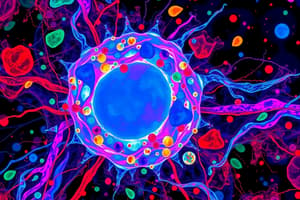Podcast
Questions and Answers
What is the primary function of the cell membrane?
What is the primary function of the cell membrane?
- To regulate the movement of materials between the cell and its environment (correct)
- To synthesize proteins
- To provide structural support to the cell
- To store genetic information
What is the main component of the cell wall in plant cells?
What is the main component of the cell wall in plant cells?
- Nucleic acids
- Cellulose (correct)
- Lipids
- Proteins
What is the function of the ER in a cell?
What is the function of the ER in a cell?
- Protein synthesis
- Passageway for intracellular transport and manufacturing surface (correct)
- Photosynthesis
- Storage of genetic material
What is the function of chloroplasts in plant cells?
What is the function of chloroplasts in plant cells?
What is the function of leucoplasts in plant cells?
What is the function of leucoplasts in plant cells?
What is the function of the Golgi apparatus in a cell?
What is the function of the Golgi apparatus in a cell?
What is the organelle that directs the life processes of a cell?
What is the organelle that directs the life processes of a cell?
What is the location of the cell wall in plant cells?
What is the location of the cell wall in plant cells?
What is the main component of the plasma membrane?
What is the main component of the plasma membrane?
What is the function of the cell membrane in plant cells?
What is the function of the cell membrane in plant cells?
Flashcards are hidden until you start studying
Study Notes
Cell Discovery
- Antonie van Leeuwenhoek discovered free living cells in pond water in 1674 using a primitive microscope.
- Robert Brown discovered the nucleus in 1831.
- Matthias Jakob Schleiden (1838) and Theodor Schwann (1839) presented the cell theory, stating that all plants and animals are composed of cells and that the cell is the basic unit of life.
Cell Structure
- Every cell has a plasma membrane, nucleus, and cytoplasm.
- The plasma membrane allows or permits the entry and exit of some materials in and out of the cell.
- The nucleus is a double-layered structure that contains chromosomes, which are visible as rod-shaped structures only when the cell is about to divide.
- Chromosomes contain information for inheritance of characters from parents to next generation in the form of DNA molecules.
Cell Organelles
- Endoplasmic reticulum (ER) serves as channels for the transport of materials between various regions of the cytoplasm or between the cytoplasm and the nucleus.
- ER also functions as a cytoplasmic framework providing a surface for some of the biochemical activities of the cell.
- Golgi apparatus consists of stacks of membrane-bound vesicles that function in the storage, modification, and packaging of substances manufactured in the cell.
- Lysosomes, mitochondria, and plastids are other important cell organelles.
- Plastids are found in plant cells and are of two types: chromoplasts and leucoplasts.
- Chromoplasts contain chlorophyll and perform photosynthesis, while leucoplasts are responsible for storage.
Cell Function
- Cells perform certain basic functions that are characteristic of all living forms, such as detoxifying poisons and drugs.
- Cells have a division of labor, meaning different parts of the body perform different functions.
- The shape and size of cells are related to the specific function they perform.
Studying That Suits You
Use AI to generate personalized quizzes and flashcards to suit your learning preferences.





